Brinjal, also known as Eggplant, is a hot weather vegetable most gardeners consider annual. Given their tropical and subtropical division, Eggplants require relatively high temperatures like Tomatoes and Peppers. Some common cultivars contain egg-shaped fruit, purple with shiny and white flesh, and spongey, meaty structure. Some other cultivars are white and long in shape. These are the question that arises in your mind when Eggplant grows, whether in pots or on the grounds.
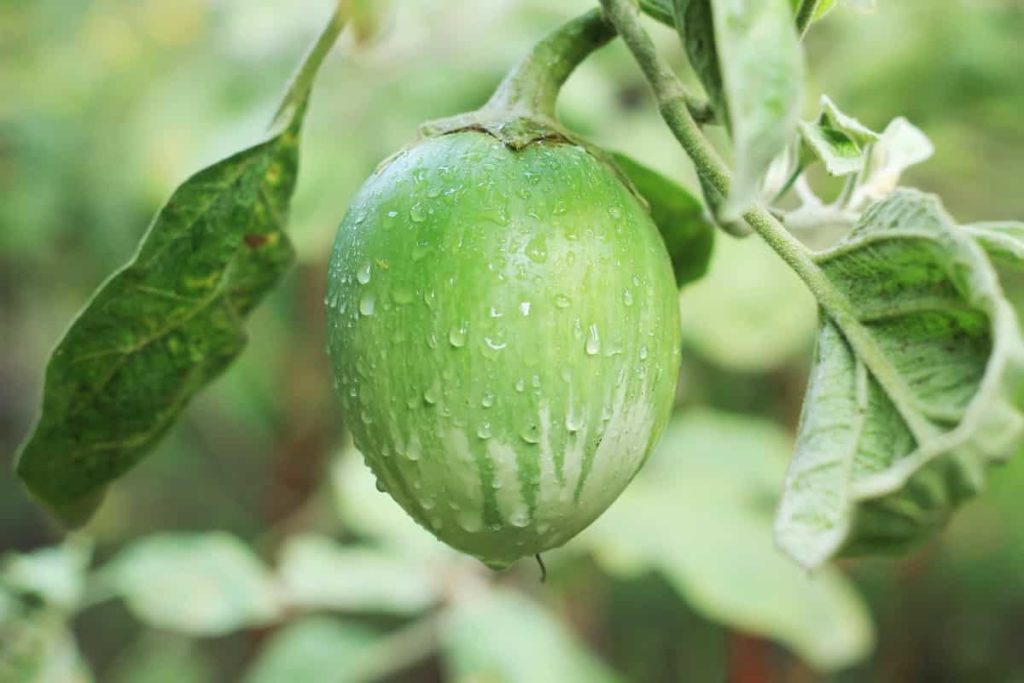
How to grow Eggplant/Brinjal from seed to harvest
How long does it take Eggplant to go from flower to fruit?
- In various regions, various cultivars of Eggplant will produce mature fruits within 50 to 80 days after flowering.
- When starting with seed, expect 100 to 120 days for maturity. July, August, and September (even in October) are harvest months for Eggplant, depending on the plant you planted and where you live.
- Fruits add beautiful colors to your garden when they appear, an excellent complement to decorative flowers. However, when you can press your thumb into the fruit and the dent you make, harvest remains in the flesh.
When should Eggplant start flowers?
Eggplant is a self-pollinated plant with female and male organs in flowers. The Eggplant fruit appears in the female part of the flower when it is pollinated with male pollen. Almost it takes eight weeks for the Eggplant to flower.
What growing conditions do the Eggplants need?
Eggplant excels on light-textured lands such as sandy loams or alluvial deep and free drainage soils. This soil warms up quickly in spring and is suitable for early plantation. Avoid soggy soils. A pH of soil between 6.0 to 7.0 is required.
Do the Eggplants need full sun?
As a basic rule, vegetables are grown for their fruit or roots, such as Tomatoes, Eggplants, Peppers, Squash, Potatoes, or Carrots requiring full sun; choose a location that receives at least six hours of direct sun every day.
How much room does the Eggplant need?
Select a site in your garden where you haven’t grown Tomatoes, Potatoes, Peppers, and Eggplants for the last three or four years. You can space the Eggplant 18 inches apart, 30 to 36 inches in rows.
How deep should the Eggplant be planted?
- Although Eggplant seeds are small, the seeds are sown with good quality potting soil in flats or cell containers at a depth of about 1/4 inches.
- Keep the root zone moist in the growing season. The roots of the Eggplant reach about 2 feet deep, and plants should not be subjected to water stress. Stress during blooming can cause a significant deficiency in the fruit set. Keep proper moisture in deep soil layers even when plants are small.
- Cover with potting mix, spray water and place a moisture dome or plastic wrap over the seed tray. Keep seeds moist and warm; they should grow in 10 to 21 days.
At what temperature do the Eggplants grow?
It thrives in the full sun and requires at least five months of warm weather to produce fruits. The maximum temperature growing during the day is between 21 to 25°C. When the temperature rises above 35°C, the Eggplant stops setting fruit and can drop flowers or abort immature fruits.
In case you missed it: 21 Common Eggplant Problems: How to Fix Them, Solutions, and Treatment
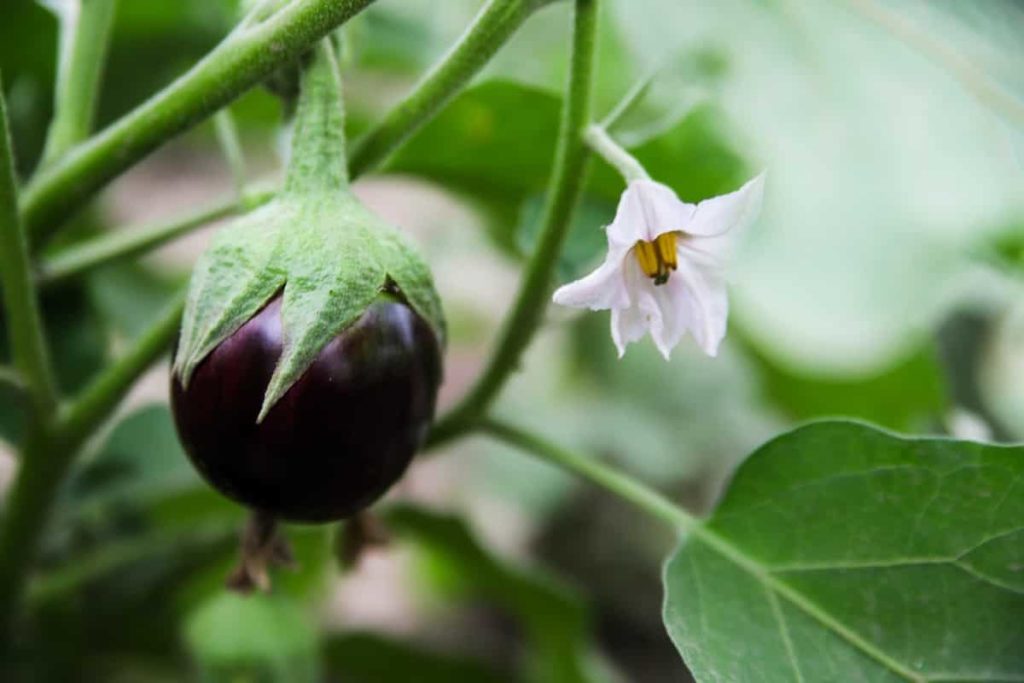
What can the lowest temperature Eggplant tolerate?
Eggplant is more sensitive to cooler temperatures than Tomatoes and Peppers. Flowers constantly keep the fruit o 15°C temperatures at night. The Eggplants begin to suffer a cooling injury at temperatures below 10°C.
Can Eggplants grow in pots?
- Eggplants grow easily in pots like Tomatoes in pots. However, they need enough large containers to support the roots of such a heavy plant, a well-draining medium, extra food and consistent water, and the right container.
- Plant an Eggplant per container, at least 2 gallons. Fill the container with high-quality potting soil that will drain faster. Add a balanced, slow-release fertilizer to planting every few weeks during the season, especially when the plants start to bloom. Water is deep and consistent, but not much water.
What kind of soil is best for Eggplant?
Before transplanting your Eggplants into the garden, work with organic matter, such as aged manure or compost, into the soil. When soil pH is between 5.5 and 6.0, Eggplants grow best at 6.
Can you overwater Eggplant?
- Eggplants suffering from excessive water and drought eventually die. The roots rot when you give high water, which prevents plants from taking water and causes them to wilt. Underwater plants also wilt, grow poorly and produce pithy fruits.
- The leaves of an overwater Eggplant will also show signs of this problem. Overwater symptoms include a premature leaf drop and soft or mushy kinds of roots. Such symptoms cause the leaves to become curled and also wilted.
How often do you water Eggplants in pots?
- You should water potted Eggplants deep and consistent, but not much water. Eggplants must dry a little between watering the mulch with grass clippings free from straw, leaves, or pesticides to help maintain soil temperature.
- Eggplant requires consistent water, at least 1 inch per week. It is better to soak well often than give short water because the water repeatedly promotes shallow roots. The weather and soil type will also affect the water demand.
Does Eggplant need a trellis?
Yes, it’s a wise idea to create a trellis for Eggplant. The stalking Eggplant prevents the fruit from touching the ground, reducing the risk of disease and promoting the form of fruits, especially for elongated Eggplant varieties.
Should I pinch the Eggplant flowers?
Different varieties that grow large, heavy fruits should not contain more than 5 to 6 fruits per plant. Once you have half a dozen flowers maturing well, pinch any extra flowers until your fruits are ready for harvesting.
How do I protect my Eggplant in winter?
A simple mulch cover on the soil can help protect your Eggplant roots and keep the soil intact with its nutrients. But your Eggplant stem and flowers also need protection.
How many Eggplants do you get from a plant?
The standard Eggplant produces egg-shaped, shiny, purple-black fruit. An Eggplant plant produces 4 to 6 large round fruits.
What is the lifespan of the Eggplant plant?
Most Eggplant cultivars are grown annually and thus live for only one year. In this case, the plants die immediately after harvesting the Eggplant fruit. Eggplant can be grown as a perennial, which will survive for about three years, but it is unusual.
Do Eggplants grow back every year?
- The Eggplant of a perennial plant, is rare outside of the tropical climate. However, eggplants can return to ideal tropical conditions every year.
- This plant is in the same Solanaceae family as Tomatoes and Peppers so that it can grow yearly in terms of climate.
In case you missed it: Soil Preparation for Eggplant/Brinjal: Best Soil Mix, pH, Compost, and Recipe

How tall is the Eggplant plant?
Plants can be 2 to 4 feet tall and wide, so they must be staked out. Eggplants also thrive in the heat, like Tomatoes and Peppers, so they go out until the cool spring temperatures pass.
How do you successfully grow Eggplant?
Eggplants grow in tall, angular plants, so they should be kept at a distance of 24 to 36 inches. Improve planting holes by mixing in 2 inches of compost to help retain moisture and fertilizer in the soil. Set the plants in the same depth they are growing in their containers and the water well before spreading the mulch.
Should I remove Eggplant seeds?
- The Eggplant seeds should be soft. Take them out if the seeds are brown.
- Cut the Eggplant and separate the flesh from the seeds. Place all the seeds in a bowl with water and wash the pulp. Strain the seeds, pat them dry, and spread them on the tray so that more than two seeds are not thick.
Are Eggplant seeds hard to grow?
Growing Eggplant from seed is an easy process. These tender annuals need full sun, well-draining, a little acidic, fertile soil, and a long growing season. No special preparation of Eggplant seed is necessary before sowing. Eggplant seeds grow at temps between 15 to 35°C.
How long are Eggplant seeds good?
Store the Eggplant seeds in an airtight container in a cool, dark, and dry place. The Eggplant seeds will be viable for 4 to 6 years when stored in these conditions.
Why is my Eggplant seedling not growing?
- Eggplants are sensitive to cold. Therefore, a transplant has been planted in cold soil; a young plant has suffered cold weather or a transplant that was root bound before planting can stop for a while or a full growing season.
- Seeds are sensitive to temperature and do not sprout unless they feel right temporary. For Eggplant, that’s hot, peppers especially before they sprout, it’s too hot. So if you’re doing it indoors, you either wait until it’s hot or get a heat mat.
Should I soak Eggplant seeds before planting?
Yes, you can soak your Eggplant seeds in water for 24 hours. This can increase the number of seeds that grow and how quickly they sprout. Use organic potting soil if you are starting seeds for transplants indoors or outside in small pots.
Can you direct sow Eggplant seeds?
- If the soil temperature is warm enough, the Eggplant seed can be sown directly in the garden, and there are plenty of days in the season to reach plant maturity.
- You can start seedlings indoors and should be placed under the growing lights or in a sunny window after growing.
How do you grow Eggplant faster?
- Eggplants need warm soil. You can accelerate the growth of Eggplants by layering black plastic on the soil of your garden a few weeks before planting or by mixing them with compost.
- Sow Eggplant seeds in cell packs or small pots, 1/4 inches deep. Water them well, cover them with plastic bags or plastic seedling flat covers to maintain moisture, and place them in a hot place over the refrigerator, or the heat mats will be perfect. Keep the soil moist.
How much time does it take for Eggplant seeds to sprout?
You can sow Eggplant seeds indoors four weeks after the last frost date. Use the bottom heat, and keep the seedlings warm. The best soil temperature for germination of Eggplant seeds is 24 to 32°C. Seeds should sprout in 12 to 20 days.
What is a good companion plant for Eggplant?
Both sweet and hot Peppers make a good companion plant, as their growing needs are the same, and they mostly like suffer from the same pests and diseases. Tomatoes are often used as Eggplant companions. Potatoes and spinach also make great companion plants.
In case you missed it: Best Fertilizer for Eggplant: Homemade, Liquid, Organic, Compost Manure, NPK, and Schedule.
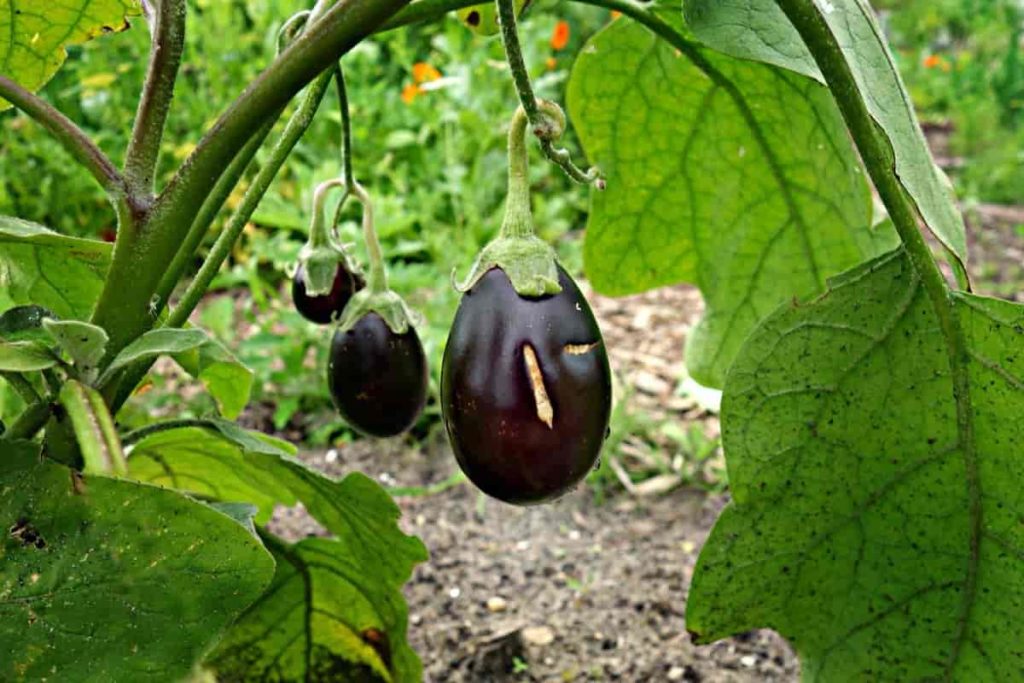
Do Eggplants and Zucchini grow well together?
Eggplant and Zucchini grow well together in similar situations. Both plants are fruity; only a few are required to produce enough fruit for fresh use. Plant some extra plants to save for later use or share with neighbors. Keep harvesting, and these plants will produce fruit grace throughout the season.
Do you need more than one Eggplant to produce fruit?
- The Eggplant seedlings can be kept warm by covering the garden with a floating row cover. The cover can last until set in the summer heat, but adjust it as the plants are tall.
- The Eggplants pollinated themselves, so the cover does not need to be removed to give them access to pollinated insects.
Can you put two Eggplants together?
You can put two Eggplants together, but at a distance of 2 1/2 feet, you will keep away from accidentally breaking branches as you harvest your Eggplant fruit. If you are putting up a lot of Eggplants and need rows, leave an area of 30 to 36 inches.
Can you plant the Eggplant and Basil together?
Eggplant can be grown with different herbs. Herbs are known for their strong aromatic fragrances and can naturally help to repel insects or attract pollinated individuals to the plot. Weeds planted with Eggplant include Basil, Dill, and Celery. All these good Eggplant companion herbs.
What shouldn’t you plant on the Eggplant?
You do not plant Eggplant near Corn, Pumpkins, Melons, Fennel, Kohlrabi, or Beans.
Do bees are needed to pollinate Eggplants?
The Eggplant flower is usually pollinated by air, which means it does not rely on insects like bees and moths to pollinate it. The problem of pollination can arise when the weather conditions are too wet, overly humid, or overheated.
What spray do you spray on Eggplant leaves?
You can spray a variety of chemical pesticides labeled flea beetles. Organic options are neem oil and garlic-based spray. You may need to spray every week when the flea beetle tapers off for the season.
How do you protect Eggplant from insects naturally?
Eliminating the insects in your Eggplant with a strong blast from your garden’s hose can help control small flea beetle populations. Also, prevent insects from reaching your Eggplant by covering the seedlings and young plants along the floating row cover.
Is Epsom salt good for Eggplant?
As plants grow, they also need moisture. They do well with drip irrigation systems, but many water methods work. When the first flower appears, spray the plants with a powdered extract, with a teaspoon of Epsom salt per gallon dissolved. The solution improves the fruit set.
Do Eggplant plants like coffee grounds?
Eggplants thrive in acidic soil; adding the coffee ground will help the soil reach a proper pH.
What is the best natural fertilizer for Eggplant?
Prepare a soil mixture with 1/4 compost and well-rotten cow manure or chicken manure. Add this fertilizer even during the growing season. Eggplants are heavy feeders, but nitrogen avoids adding high fertilizer levels as it will result in more green leaves than fruit.
In case you missed it: Eggplant Companion Plants, Planting Guide
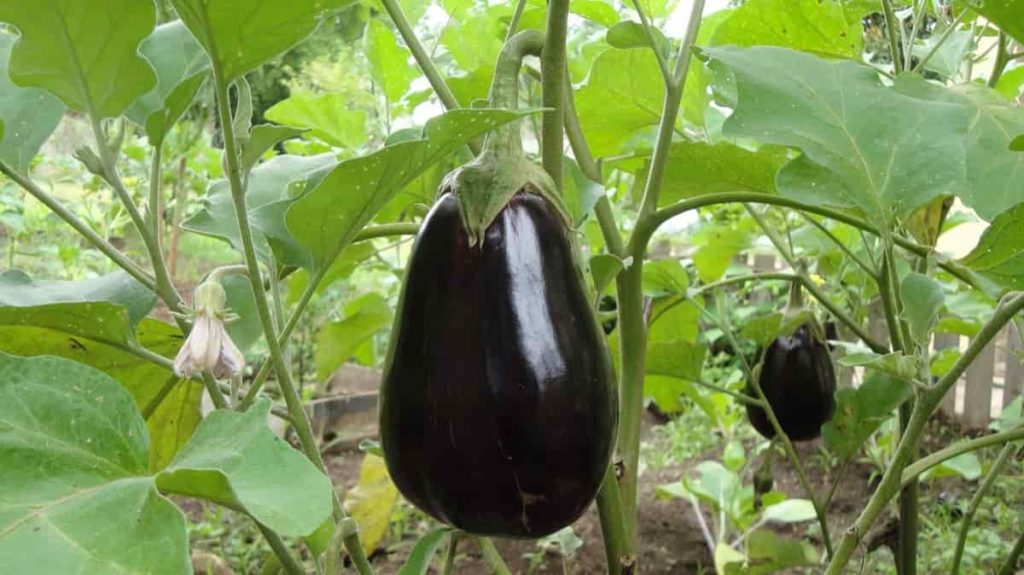
What is the best fertilizer for Eggplant?
- You can apply a balanced fertilizer (10-10-10) often prescribed for Eggplant. However, feeding too much nitrogen at the flowering stage can result in large, leafy plants that fail to produce fruit.
- Start with lots of compost work in the soil, plus 900 to 1300 grams of complete fertilizer like 15-5-10 per 100 square feet. If you prefer, use an organic fertilizer such as blood meal, well rotten manure, cottonseed meal, or bat guano.
How big is the Eggplant before harvesting?
You can harvest the Eggplant when they are one-third to two-thirds fully mature size. There are many types of Eggplant, and they produce many different size fruits.
How do you grow big Eggplants?
Eggplants grow in tall, angled plants, so they should be kept at a distance of 24 to 36 inches. Improve planting holes by mixing in 2 inches of manure to help keep moisture and fertilizer in the soil. Set the plants in the same depth they are growing in their containers and the water well before spreading the mulch.
How many times Eggplant can be harvested?
Harvesting can take 55 to 60 days after transplant. Fruits are cut at the tender stage at 4 to 5 days intervals.
What is the average yield of Eggplant crops?
Since not all fruits mature simultaneously, fruits are harvested at intervals of 8 to 10 days. Depending on different types and weather, the average production of Eggplant varies from 20-30 tons per hectare.
How do you increase Eggplant yield?
If you have a set of poor fruits, hand-pollinate flowers to help increase production. Use an electric toothbrush to vibrate the flower’s fabric to help move the pollen inside the flowers. The more frequent the fruit harvest, the higher the fruit collection.
How do you know when to harvest the Eggplant?
- When the inner flesh is cream-colored, the fruits are strong, and the Eggplants are harvested before the seeds appear.
- Cutting into fruit may be needed to test the color of flesh and size of seeds to learn when to harvest the Eggplant.
Why is my Eggplant not bearing fruit?
Eggplants become stressed and stop producing fruits for many reasons, mainly inadequate water and temperature above 32°C. In addition to dry conditions, flowers can fall due to cold weather, pollination problems, soil deficiency, or pest damage.
Why do flowers fall from my Eggplant?
- Eggplant flowers drop due to dehydration. When the Eggplant is stressed, its flowers drop and fall without producing fruit.
- Eggplant requires 1 inch of water a week, more in very hot weather.
Why are my Eggplant leaves turning yellow?
Yellowing leaves are often caused by maintenance problems such as irregular water or lack of nitrogen in the soil. Plants not getting enough water can initially wilt during the afternoon, yellowing with increased water stress. You should water when the soil dries up.
What are the stages of the growing Eggplant?
- Seed stage
- Germination stage
- Seedlings stage
- Adult plants stage
- Flower stage
- Fruit stage
- Harvesting stage
Why I am not getting Eggplants?
Eggplant is a particularly thirsty plant, and they don’t perform well in dry spells. Dehydration leads to a stressed plant dropping flowers and producing no fruit. Even if they look otherwise healthy, when Eggplants drop their flowers in the summer heat, the real culprit is usually water.
Why are my Eggplants so small?
Container-grown Eggplant needs regular feeding, though you must look out for excessive salt buildup that can cause the plants to stop growing. You should drench the containers with clean water to leach out accumulated salts.
How can you tell a male and female Eggplant?
Male eggplants have fewer seeds and are less likely to become bitter. To distinguish between male and female Eggplant, inspect the flower end. The male has a smaller, rounded, smooth end; the end of the female is irregular and less smooth.
In case you missed it: How to Prepare the Soil for Cherry Trees: Best Soil Mix, pH, and Compost
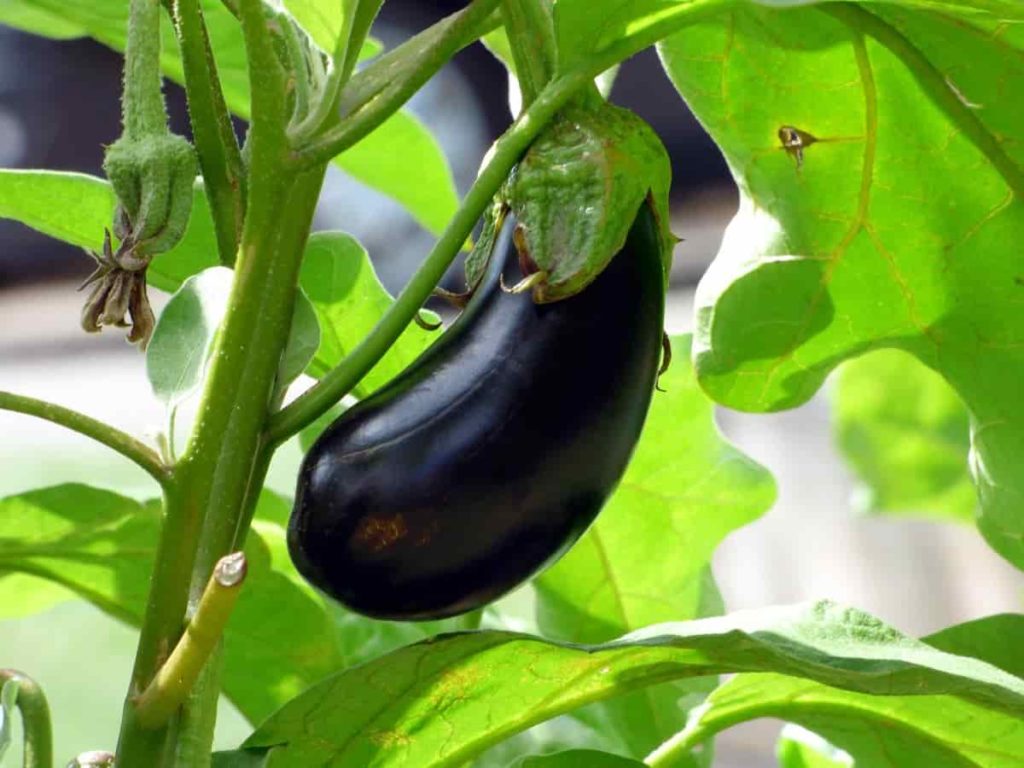
Why are my Eggplant leaves curling up?
If your Eggplant leaves are curling, it could be caused by plant viruses, pest attacks, or one of the most common mistakes gardeners make: underwater or overwatering.
Why are my Eggplant leaves white?
One of the most common reasons for Eggplant leaves to whiten is due to the sun’s burns. White starts as small spots in this instance and eventually spreads to engulf the entire leaf.
What is the problem with Eggplant?
Several Eggplant diseases affect these crops. Some diseases include blossom end rot, wilt diseases, and a variety of blights. These Eggplant diseases can be prevented by following crop rotation, reducing weed growth, and providing adequate distance and uniform water.
Why are my Eggplants dying?
If your Eggplant is dying, water problems should be the first to assess you. When given too much water, the Eggplants will wither and fall, and the roots (and possibly even the stem) can change color and become weak. It can also cause roots to rot. Eventually, if he is not treated, the Eggplant will die.
What are the little black insects eating my Eggplant leaves?
- Flea beetles are small black bugs that chew holes in leaves as if someone had peppered them with small buckshot. They will attack Mustard, Radish, and sometimes cool crops, but Eggplant is their favorite.
- Mechanical control includes hand-picking pests. It’s an easy strategy for large, slow-moving pests, such as hornworms and Colorado potato beetles. Remove the insect from the plant, squash it, or drop it in a bottle of soap water.
Do you have to pollinate Eggplant flowers?
Eggplant flowers need pollination to produce Eggplant. Usually, they just need a draft of light wind or stirring of the surrounding air caused by the gardener walking nearby.
Can you plant a store-bought Eggplant?
First, you need to buy a good-sized Eggplant that is not affected, has seeds, and should not be a hybrid. You will grow new plants from Eggplant seeds.
Can I transplant an Eggplant?
Take out the Eggplant seedlings in the garden, so the shoots are on the soil line as before the transplant. Scrape dry surface soil from the plantation area. With a hand shovel, make a hole large enough to receive the transplant root ball easily. Strengthen the soil around the roots and water the transplant.
Can you grow Eggplant indoors?
Growing Eggplant indoors is difficult as providing enough heat and light is challenging. The clear solution is to build a growing system that increases the heat and includes grow lights. It still may not result in fruit, but you will be a beautiful Eggplant as a homemade plant.
How do you take care of the Eggplant?
Eggplants work best when soil is constant soil moisture. Water is regular, especially when plants are small, so their roots are deep. Avoid overhead watering to avoid disease, but consider using mulch to keep the soil moist and warm and keep weeds down. Usually, the Eggplant should get one inch of water.
What is a millionaire Eggplant?
Millionaires’ early maturity and huge amounts of very thin, almost black fruit that are virtual without seeds outshine other varieties of Eggplant. This attractive, upright grower will provide much satisfaction and enrich your vegetable garden.
Can you plant Eggplant in a raised bed?
You can grow Eggplants in raised beds that fast heat up in spring. Lots of rooms given plants are healthy and more productive, so accommodate them 2 1/2 to 3 feet in each direction. Water well, add 1 to 2 cups of compost around each plant, and firm the soil gently.
How do you grow Eggplant in 5-gallon buckets?
- Choose a pot or a container that ideally has a capacity of at least five gallons. Make sure there are drainage holes. Choose a well-drained potting mix and balanced fertilizer. Plant your Eggplant seedlings, then water well.
- Like tomatoes, it’s a good idea to provide support for your plants as a fruit shape and start growing.
Can you grow Eggplant vertically?
Yes, vertical gardening with Eggplant is a possibility. The advantage of Eggplant, or any vegetable, is that it keeps the plant and the resultant fruit away from the ground and from any pests that want a snack and reduces the chances of soil-produced diseases.
Can you grow Eggplant from cutting?
To grow Eggplant from cutting, take your cuttings from existing plants at the end of the first growing season and start them indoors. After the last frost waits a few weeks to ensure the hot weather is on its way before moving them to the garden, as the Eggplants need warm soil to grow.
Which Eggplant varieties are growing easier?
Some Eggplant types are easy to grow, including large oval Eggplants, elongated Eggplants, and white Eggplants. Give the Eggplant a warm spot and warm soil and keep them equally watery and stress-free, and they will bless you with beauty and flavor.
Conclusion
Eggplant is a versatile crop that adapts to different agricultural climate areas. Eggplant can be grown throughout the year. It is grown as a perennial but commercially annual crop. Eggplant varieties show a wide range of fruit shapes and colors, from oval or egg shape to long club shape, and almost black through white, yellow, green to purple pigmentation to nearly black. Whether growing in containers, raised beds, or on the ground, these questions are common for growing Eggplants. By using this article, you will know all the answers to your questions.
- Flower Garden Designs and Layouts for Beginners
- Planting and Spacing Techniques in Papaya: A Beginner’s Guide
- Growing Gold: Essential Techniques for Planting Pineapples
- How to Make Kalanchoe Plant Bushy: Home Remedies and Solutions
- 11 Reasons Why Your Gardenia is Not Blooming: Home Remedies and Solutions
- Eco Elegance: The Guide to Designing a Drought-Tolerant Landscape
- Gardening on a Slope: Strategies for Hillside Landscaping
- Nourish and Flourish: Top Organic Mulches for Thriving House Plants
- Everything You Want to Know about Indian Mogra Flower: Discover Uses and Growing
- Green Thumb Success: Expert Tips for Cultivating Greenhouse Pumpkins All Year Round
- Maximize Growth & Flavor: The Ultimate Guide to Companion Planting in Herb Gardens
- How to Control Rhododendron Problems Naturally: Home Remedies and Organic Ways to Fix Them
- Natural Magic: The Remarkable Benefits of Cinnamon for Plants
- Best Steps to Revive Dying Tulip with Natural and Organic Treatment
- 10 Reasons Why Your Angel Trumpet is Not Blooming: Remedies and Treatment
- How to Fix Periwinkle Leaf and Flower-Related Problems: Natural Remedies and Solutions
- How to Fix Zinnias Leaf and Flower Problems: Discover Natural and Home Remedies
- Organic Steps to Induce Lemon Tree Flowers: A Comprehensive Guide
- Bloom Booster: Crafting the Perfect Homemade Bougainvillea Fertilizer
- Optimizing Growth: A Guide to Applying NPK Fertilizer for Potted Plants
- 10 Best Homemade Fertilizers for Rubber Plant: DIY Recipes and Application Method
- How to Boost Female Pumpkin Flowers: Effective Steps for More Flowers and High Yields
- Transform Your Indoor Garden: Top Benefits of Pink Salt for Houseplants
- 10 Best Homemade Fertilizers for Peacock Plants (Calathea): Easy DIY Guide
- Unlock Blooms: 9 Reasons Why Your Potted Chrysanthemum is Not Blooming
- 8 Reasons Why Your Potted Hibiscus is Not Blooming: Fix it with Simple Solutions
- Unlock Blooms: 9 Key Reasons Your Potted Frangipani Won’t Flower
- 10 Reasons Why Is My Ice Plant Not Blooming: Remedies and Treatment
- 10 Reasons Why My Potted Hydrangea Not Blooming: Treatment and Remedies
- 10 Reasons Why is My Wisteria Not Blooming: Remedies and Treatment
- 10 Reasons Why is My Goldfish Plant Not Blooming: Remedies and Treatment
- Maximize Your Space: Ultimate Guide to Balcony Gardening with Grow Bags
- 10 Reasons Why Your Iris is Not Blooming: Remedies and Treatment
- 10 Reasons Why Your Anthurium Plant is Not Blooming: Treatment and Remedies
- 10 Reasons Why Your Aquaponic Plants Are Not Flowering: Remedies and Treatment
- 10 Reasons Why Your Agapanthus is Not Flowering: Remedies and Treatment